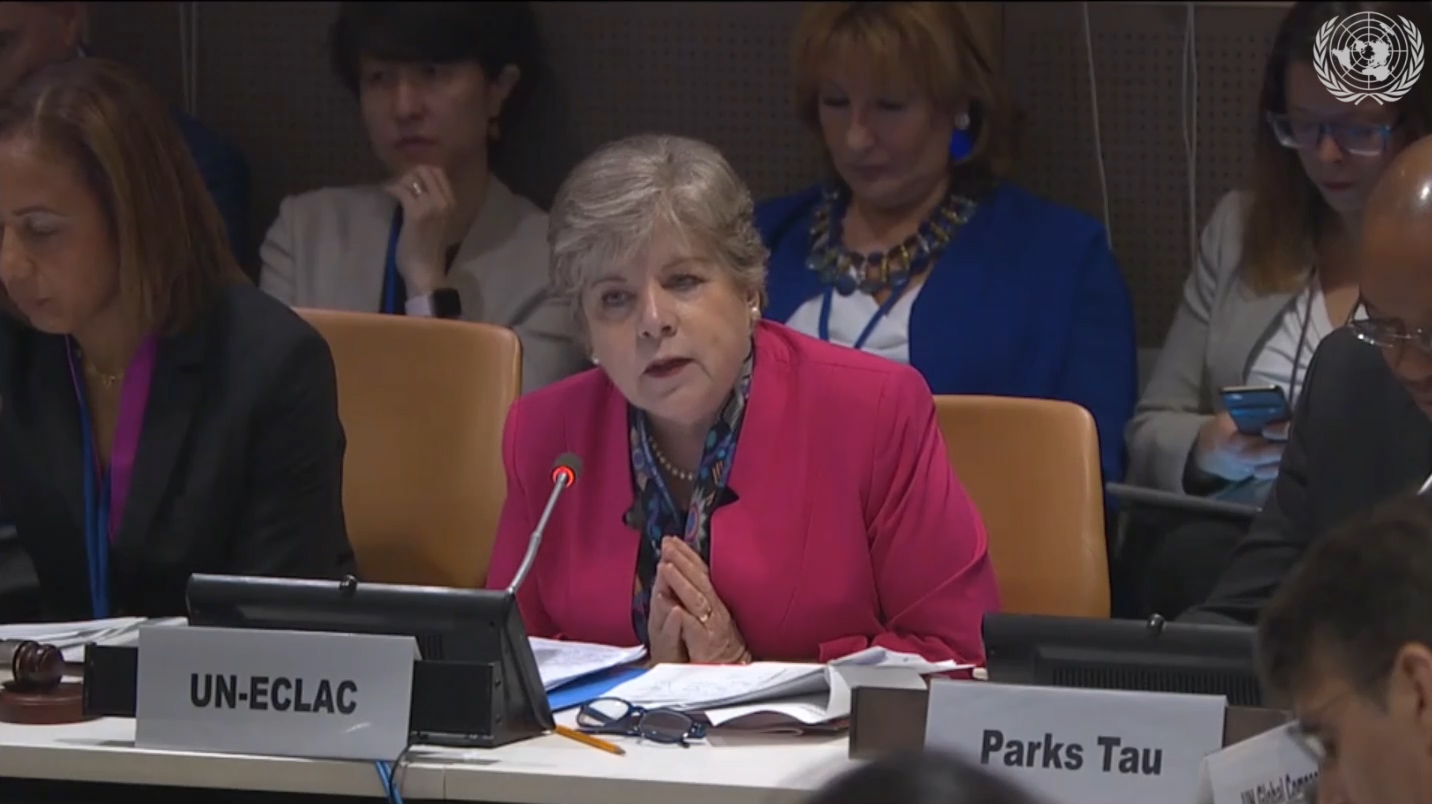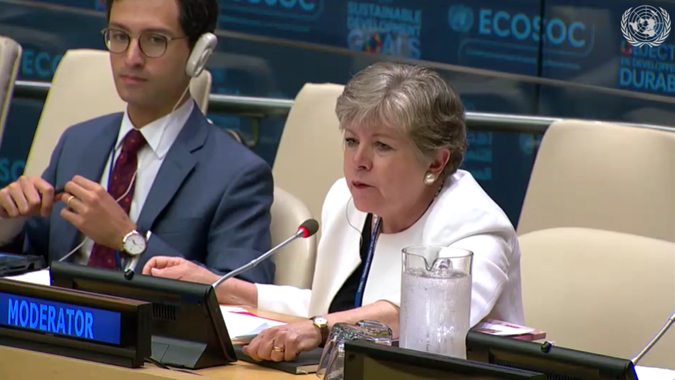Alicia Bárcena: Addressing Inequality at the Local Level is Essential to Achieving Sustainable Development
Work area(s)
In the context of the 2019 High-Level Political Forum on Sustainable Development, ECLAC’s Executive Secretary took part in different sessions in which she addressed the importance of local action, combating inequality in the 21st century and the role played by regional commissions in the implementation of the 2030 Agenda and the SDGs.

Alicia Bárcena, Executive Secretary of the Economic Commission for Latin America and the Caribbean (ECLAC), asserted today at United Nations Headquarters in New York that addressing inequality at the local level is essential for the implementation of the 2030 Agenda and its 17 Sustainable Development Goals.
The senior international official inaugurated the session on Local Action for Global Commitments, held in the framework of the 2019 High-Level Political Forum on Sustainable Development, which convened experts from the public, private and non-governmental sectors, local leaders and UN agency representatives.
Other participants in the session included Maimunah Sharif, Executive Director, UN-Habitat; Guy Rider, Director-General, International Labor Organization (ILO); Lise Kingo, Executive Director, United Nations Global Compact; and Parks Tau, President, United Cities and Local Governments.
During her presentation, Alicia Bárcena underscored the importance of local contributions to meet the SDGs, as well as the inter-relationship between national, regional and local action for their implementation.
She said that inequality is a major issue, especially in Latin America and the Caribbean, the most unequal region in the world, where one in five people live in slums. In addition, 80% of the region’s inhabitants live in cities and 48.4% of jobs done by people living in those cities are informal labor, and therefore lack any type of social security.
“This is why we feel inequality is hitting really hard in our cities, where the Gini Index is even higher than 0.5,” she affirmed.
Alicia Bárcena highlighted that “ECLAC is proposing a ‘big environmental push,’ meaning we transform all investments, all actions in cities, into a framework of sustainable development. All private investors – everyone – must work on low-carbon investments,” she stated.
ECLAC’s Executive Secretary later moderated a United Nations dialogue on inequality in the 21st century and the need for a coordinated effort to measure and understand its multiple dimensions and the potential for change.
Participating along with Alicia Bárcena were Elliot Harris, UN Assistant Secretary-General for Economic Development and Pedro Conceiçao, Director, UNDP Human Development Report Office.
In the context of her remarks, ECLAC’s senior representative asserted that the promotion of inclusion, the eradication of poverty and the elimination of discrimination in all its multiple forms constitute the core of the United Nations mandate.
She underlined the need to put a face on inequality and change the paradigm: “Equality is a driver of growth, not a compensation. With greater productivity, we will have more egalitarian societies,” she said.
She likewise stressed the urgency of breaking the cycle of poverty through investment in education, nutrition and innovation.
Finally, the ECLAC Executive Secretary, in her capacity as coordinator of the five UN regional commissions, participated in the session on What are regions telling us about implementation of the 2030 Agenda and the SDGs?.
Other participants included Rodrigo Malmierca, Minister of Foreign Trade and Foreign Investment of Cuba, the country currently holding the pro tempore presidency of ECLAC; Fidelis Magalhaes, Minister of Legislative Reform and Parliamentary Affairs, East Timor, in representation of the Economic and Social Commission for Asia and the Pacific (ESCAP); Nezha El Ouafi, Secretary of State in charge of Sustainable Development, Morocco, representative of the Economic Commission for Africa (ECA); Ogerta Manastirliu, Minister of Health and Social Protection, Albania, in representation of the UN Economic Commission for Europe (ECE), and Noori Al-Dulaimi, Minister of Planning, Iraq, on behalf of the Economic and Social Commission for Western Asia (ESCWA).
During her presentation, Alicia Bárcena underscored that since the adoption of the 2030 Agenda, the UN’s five regional commissions have provided Member States with platforms focused on the SDGs for debate, peer learning and capacity building.
She added that the 2030 Agenda recognizes that regional action is essential to ensure progress toward the SDGs, and underlined that the regional level helps contextualize the global goals and translate them into sustainable development reality at the national level.
“Implementation of the 2030 Agenda requires something more than the sum of national actions. The regional dimension creates a space for a true community of practice,” she affirmed.
In the context of her participation in the 2019 High-Level Political Forum on Sustainable Development, which began on Tuesday, July 9 and will continue through Friday, July 19, Alicia Bárcena will participate in a variety of official activities and side events in representation of ECLAC and the countries of Latin America and the Caribbean.
Related content

Alicia Bárcena: “Active fiscal policies are needed to finance the 2030 Agenda and ensure that no one is left behind”
On the first day of the High-Level Political Forum on Sustainable Development 2019, ECLAC’s Executive Secretary, speaking on behalf of the five United Nations regional commissions, gave an account of…
Related link(s)
Country(ies)
- Latin America and the Caribbean
Contact
Public Information Unit
- prensa@cepal.org
- (56 2) 2210 2040
